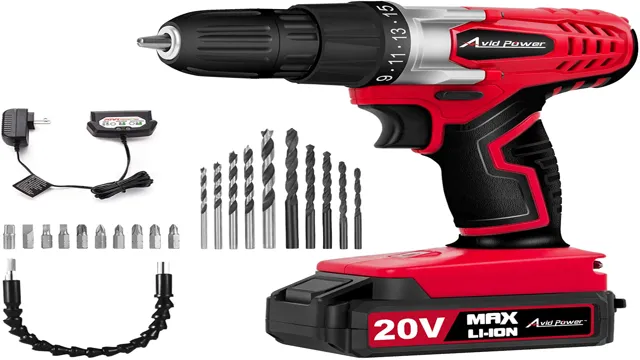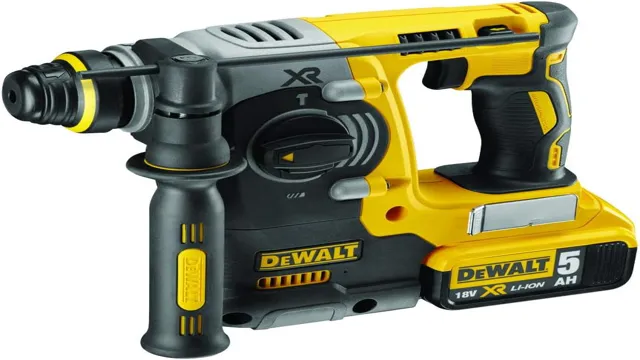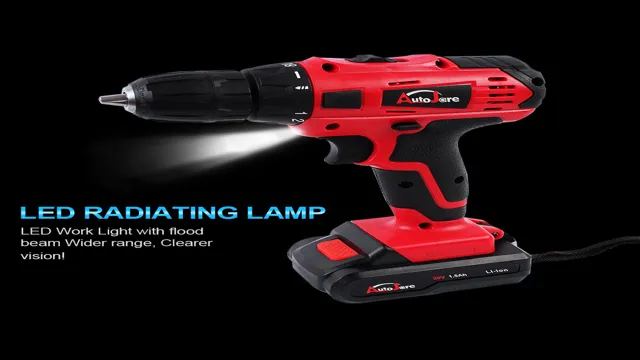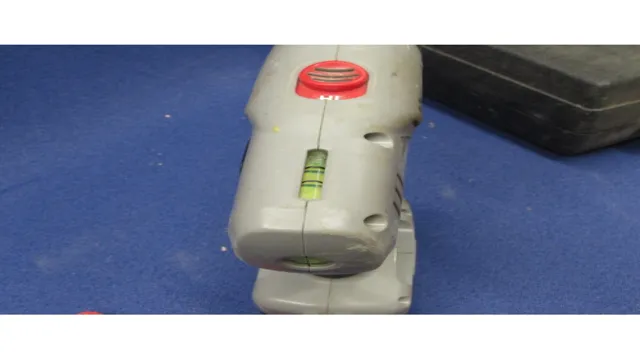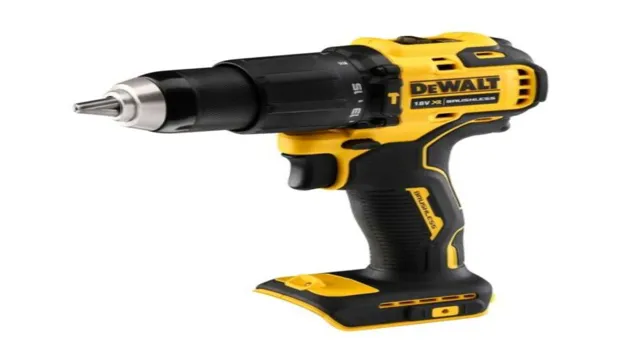Are Corded Drills Better than Cordless? Pros and Cons Compared
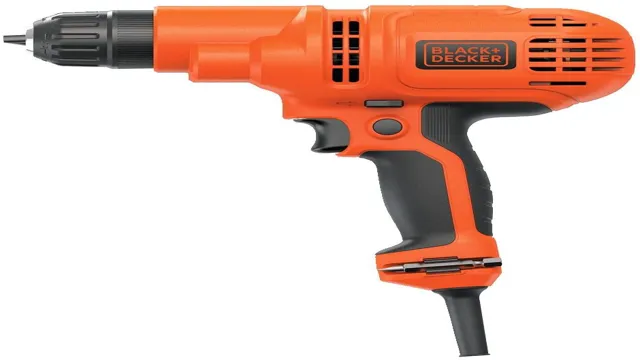
Drilling is a fundamental part of DIY projects or fixing something at home. However, the decision of whether to buy a corded or cordless drill can be overwhelming, especially for someone who hasn’t used either before. There are several factors to consider, including the type of project you want to tackle, power source, mobility, among others.
But here’s the kicker: is one better than the other? Well, that’s what we’re here to find out. In this article, we’ll delve into the pros and cons of both options to help you make an informed purchase decision. Whether you’re a professional or a beginner, we’ve got you covered.
So, buckle up and let’s explore the wonderful world of drilling!
Overview of Corded and Cordless Drills
When it comes to choosing between corded and cordless drills, the answer isn’t a simple one. While corded drills are generally more powerful and better suited for heavy-duty work, cordless drills offer the convenience and portability of being able to use them without a power outlet nearby. So, are corded drills better than cordless ones? It really depends on what you’re using them for.
If you’re doing tasks that require a lot of power, such as drilling through thick wood or metal, a corded drill may be the way to go. However, if you need to drill in tight spaces or on the go, a cordless option may be more suitable. It’s important to consider the type of work you’ll be doing and the features each type of drill offers before making a decision.
In the end, both corded and cordless drills have their advantages and disadvantages, and it mostly comes down to personal preference and the demands of your project.
Explanation of Corded Drills
Corded and cordless drills both have their own benefits and drawbacks. Corded drills, for instance, offer more power than their cordless counterparts and can run continuously without any need for recharging. This makes them ideal for larger tasks, such as drilling through thick or hard materials.
They also tend to be more durable and long-lasting, as they don’t rely on batteries that can wear out over time. However, corded drills come with their own set of limitations. They require access to an electrical outlet, which can limit their portability and make it difficult to work in areas without power.
Additionally, the cords themselves can get in the way and make it more challenging to maneuver the tool. Ultimately, the right choice between corded and cordless drills will depend on the specific needs of the project at hand, so be sure to take all factors into consideration before making a decision.
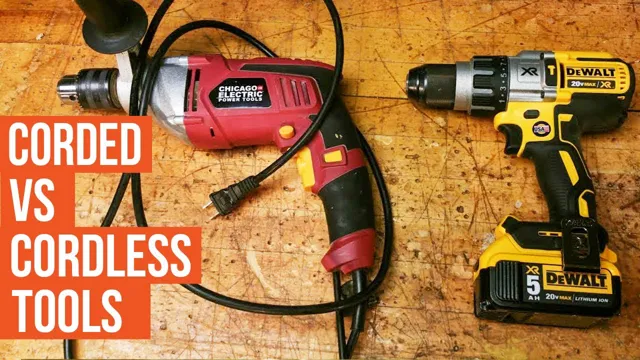
Explanation of Cordless Drills
Cordless Drills Corded and cordless drills are the two main types of drills used in households and industries these days. Corded versions are typically designed for heavy-duty tasks and come with a cord that is plugged into an electrical outlet. On the other hand, cordless drills are battery-operated, and they come in a variety of sizes designed to cater to different job types.
One major advantage of cordless drills is the freedom of movement they provide, allowing users to work in hard-to-reach or outdoor areas without having to worry about the length of a power cable. However, since they depend on batteries, cordless drills need to be charged regularly and may not be as powerful as their corded counterparts. In conclusion, if you need a drill for heavy-duty drilling, a corded drill may be your best bet, but a cordless drill is a great choice for light work and tasks that require flexibility and mobility around the workspace.
Advantages and Disadvantages of Corded Drills
When it comes to drills, a common debate is whether corded drills are better than cordless ones. While both types have their own set of advantages and disadvantages, it ultimately comes down to personal preference and specific needs. Corded drills offer consistent and continuous power, which is great for heavy-duty projects that require constant drilling.
They also tend to be more affordable and have longer lifespans than their cordless counterparts. However, corded drills can be restrictive in terms of mobility and require an electrical outlet nearby. On the other hand, cordless drills are much more mobile and versatile, making them ideal for projects that require movement or drilling in hard-to-reach areas.
They also come with a range of features such as adjustable clutch settings and LED lights for increased precision and convenience. However, they can be pricier, have shorter battery lives, and may lose power over time. Ultimately, it’s important to consider your specific needs and budget before deciding whether corded or cordless drills are better for you.
Advantages of Corded Drills (Power, Consistency, Cost)
When it comes to drills, there are two main types to choose from: corded and cordless. While cordless drills may be more convenient, corded drills have several advantages. Firstly, corded drills offer more power and consistency than their cordless counterparts.
You May Also Love:
This is because they are not limited by battery life and can deliver a consistent level of power throughout the job. Additionally, corded drills are generally more affordable than cordless drills. While the initial investment may be higher, the cost per use is typically lower due to the need for replacement batteries.
However, there are also some disadvantages to corded drills. They are usually less portable and can be more difficult to move around job sites. Overall, the decision between corded and cordless drills depends on the specific needs of the user.
But if raw power and consistency are priorities, corded drills are often the way to go.
Disadvantages of Corded Drills (Mobility, Safety)
Corded drills are a great choice for those who need constant power and don’t want to worry about charging batteries. One of the main disadvantages of corded drills, however, is their lack of mobility. Corded drills have a limited range of motion as they must be plugged into an electrical outlet at all times.
This can make it difficult to work in areas with limited electrical access or where cords can become tangled or cause tripping hazards. Another disadvantage of corded drills is safety concerns. Because the cord can easily get in the way, it can be a safety hazard to the user or others in the area.
It’s important to ensure the cord is not near any sharp objects or power tools that can cause damage or injury. Despite these disadvantages, corded drills remain a popular choice due to their powerful and reliable performance. The key is to weigh the benefits and drawbacks to determine if a corded drill is the best choice for your needs.
If you require accessibility and portability, a cordless option may be best. However, if you need consistent power and don’t mind being tethered to a power source, a corded drill may be the ideal fit for your needs.
Advantages and Disadvantages of Cordless Drills
When it comes to power tools, cordless drills are a popular choice due to their portability and convenience. They allow you to move around freely without being tethered to a power outlet. However, are they better than their corded counterparts? The answer depends on your needs.
One of the main advantages of cordless drills is their portability, which makes them ideal for construction work or DIY projects. They are also easy to store and don’t take up much space. On the other hand, corded drills have more power and are better suited for heavy-duty tasks that require drilling through tough materials.
They also don’t rely on batteries, so you don’t have to wait for them to charge. Additionally, corded drills are usually cheaper than cordless ones. While both types of drills have their advantages and disadvantages, the decision ultimately comes down to what your needs are.
If you need portability and convenience, a cordless drill might be the better option. However, for heavy-duty projects, a corded drill would be the way to go. So, are corded drills better than cordless ones? It depends on your specific needs.
Advantages of Cordless Drills (Mobility, Convenience)
Cordless Drills Cordless drills are a convenient and mobile alternative to traditional corded drills. They come with rechargeable batteries that can easily be swapped out when one runs low on power, allowing you to work on your next project without interruption. Cordless drills also allow you to work in tight spaces or on ladders without having to worry about tripping over a cord or searching for an electrical outlet.
Additionally, cordless drills are lightweight and compact, making them easy to maneuver and store. However, they do come with some disadvantages such as the need to recharge batteries frequently and the fact that they may lack the same power as their corded counterparts. When deciding between a corded or cordless drill, it ultimately comes down to individual preferences and the type of projects you plan on working on.
Disadvantages of Cordless Drills (Power, Battery Life, Cost)
Cordless drills have become increasingly popular for their convenience and ease of use. They are lightweight, portable, and user-friendly. However, there are some disadvantages associated with these drills that must be taken into consideration.
First, cordless drills may not be as powerful as their corded counterparts. They run on batteries that can quickly lose their charge, and this may limit the drill’s effectiveness when tackling tougher materials. Secondly, the battery life of cordless drills is a concern.
Most batteries have a limited runtime, which means that the drill will need to be charged frequently. This can be a hassle, especially if you are working on a project that requires extended drilling time. Lastly, cordless drills can be quite expensive.
They are considered a premium tool, and the cost reflects this. However, despite these disadvantages, cordless drills remain a popular choice for DIY enthusiasts and professionals alike. If you are in the market for a new drill, weigh the advantages and disadvantages of each option before making your choice.
Conclusion: Which Drill is Better?
After careful consideration and evaluation, it’s safe to say that both corded and cordless drills have their own unique advantages and disadvantages. Corded drills provide more consistent power and are ideal for heavy-duty tasks, while cordless drills offer better mobility and convenience for simple DIY projects. In the end, it all comes down to personal preference and intended usage.
So, whether you’re a professional woodworker or a weekend DIY enthusiast, choose the drill that suits your needs and get to drilling.”
FAQs
What are the advantages of corded drills over cordless ones?
Corded drills are often more powerful and consistent than cordless ones, as they are continuously powered by an electrical outlet.
Are corded drills more reliable than cordless ones?
Yes, corded drills are generally known for being more reliable since they do not require battery charging and are not affected by battery deterioration over time.
What are the main benefits of cordless drills?
Cordless drills offer greater mobility and flexibility since they do not require a power outlet. They are ideal for use in areas without electricity access, such as construction sites.
Are cordless drills better in terms of convenience?
Cordless drills are better if you don’t want to deal with the hassle of cords and mobility is important for your work. They are also lighter in weight, making them more comfortable to use.
Do corded drills last longer than cordless ones?
Yes, corded drills are known to have a longer lifespan since they do not rely on batteries that may deteriorate over time, and they usually have a more robust design.
What are the disadvantages of cordless drills?
Cordless drills can be more expensive than corded ones, and their battery life and power may not be sufficient for heavy-duty tasks.
Are cordless drills safe to use?
Yes, cordless drills are safe to use as long as you follow proper safety guidelines and handle the batteries with care to prevent overheating or explosions.

